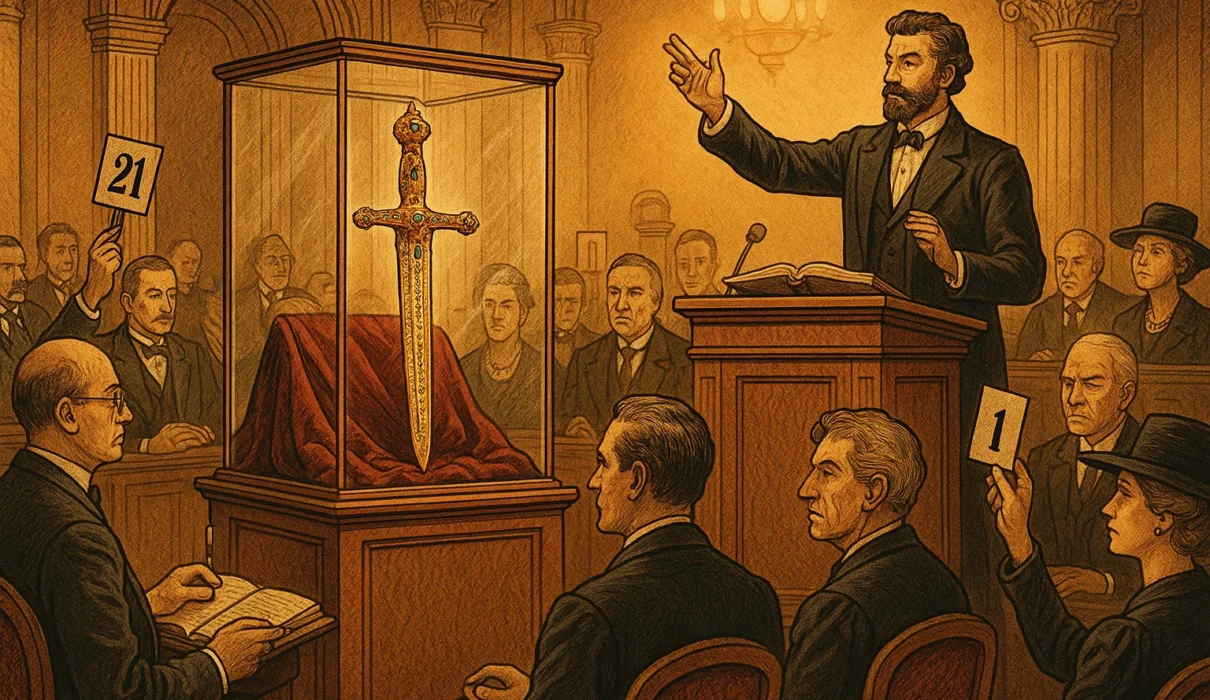Introduction
Collectors and historians share a deep fascination with swords. These aren’t just relics of warfare; they are symbols of power, artistry, and legacy. From Mughal emperors to European monarchs and Japanese swordsmiths, the most prized blades reflect cultural triumphs and turning points in history.
Today, the most expensive swords ever sold fetch millions at auctions, with elite collectors, museums, and investors competing fiercely. Each sword embodies more than craftsmanship—it tells a story of heritage, leadership, and prestige.
Why Swords Sell for Millions
Swords command such astronomical values because of:
- Historical importance – Blades tied to rulers, emperors, or legendary battles.
- Craftsmanship – Gold inlay, jade hilts, and gem-encrusted designs rival fine art.
- Cultural significance – Ceremonial or coronation swords carry symbolic meaning.
- Preservation – Condition plays a huge role; intact swords fetch far higher sums.
- Auction house credibility – Christie’s, Sotheby’s, and Bonhams attract the richest bidders.
Table: The Most Expensive Swords Ever Sold
| Sword / Artifact | Sale Price (USD) | Auction House & Year | Historical Background |
|---|---|---|---|
| Tipu Sultan’s Bedchamber Sword | $17.3 million | Bonhams, London – 2023 | The Mysore ruler’s personal sword, richly decorated with gold calligraphy; a symbol of resistance against British rule. |
| Boateng Saber (Qianlong Emperor, Qing Dynasty) | $7.7 million | Private Auction – 2008 | Chinese imperial saber with jade hilt and gold ornamentation; tied to one of China’s most powerful emperors. |
| Napoleon Bonaparte’s Gold-Encrusted Sword | $6.4 million | Auction in France – 2007 | The sword carried by Napoleon at the Battle of Marengo (1800); a masterpiece of French weaponry. |
| Nasrid Ear Dagger (Spain, 15th Century) | $5.9 million | Sotheby’s – c. 2010 | Rare Moorish-Spanish dagger with ear-shaped hilt; reflects the Islamic-Christian cultural fusion of medieval Spain. |
| Shah Jahan’s Kard Dagger | $3.3 million | Bonhams – c. 2008 | Owned by the Mughal emperor who built the Taj Mahal; crafted with jade and precious stones. |
| Samurai Katana by Masamune | Estimated Millions | Private Auctions | Forged by Japan’s most legendary swordsmith; considered a national treasure and cultural icon. |
| Ceremonial Sword of King Henry IV of France | Valued in Millions | Various Auctions | A Renaissance ceremonial blade symbolizing royal power and artistry. |
Detailed Breakdown of Each Legendary Sword
Tipu Sultan’s Bedchamber Sword – $17.3 Million
Sold at Bonhams London in 2023, this broke records for the most expensive Indian sword ever sold. Its provenance and artistry made it irresistible to collectors.
Boateng Saber – $7.7 Million
This Qing dynasty saber showcases Chinese imperial grandeur with jade and gold craftsmanship. It remains one of Asia’s most valuable weapons.
Napoleon’s Gold-Encrusted Sword – $6.4 Million
A weapon tied to Napoleon’s rise during the Battle of Marengo. Its gold embellishments make it as much a piece of art as a weapon of war.
Nasrid Ear Dagger – $5.9 Million
Unique in design and rare in preservation, this dagger is a gem of Moorish Spain, representing cultural crossroads in medieval Europe.
Shah Jahan’s Kard Dagger – $3.3 Million
This jade-hilted dagger belonged to the emperor behind the Taj Mahal, reflecting Mughal artistry at its peak.
Masamune Katana – Priceless Legacy
Though sales are often private, Masamune’s swords are revered as priceless, with collectors paying millions when they surface at auctions.
Ceremonial Sword of King Henry IV of France
A Renaissance masterpiece blending politics, culture, and fine European weaponry.
Auction Records and Trends
- Record-breaking sales prove rising interest in heritage weapons.
- Authenticity and provenance often decide final prices.
- Competition among collectors ensures values keep climbing.
- Global demand is growing, with Asian, European, and Middle Eastern swords all commanding attention.
Famous Auction Houses
- Christie’s – Specialist in royal and European collections.
- Sotheby’s – Known for high-value Asian and European swords.
- Bonhams – Dominates South Asian and Islamic artifacts.
- Heritage Auctions – Covers broader categories including historic arms.
Are Expensive Swords Worth It?
Yes—for multiple reasons:
- Historical preservation – They safeguard culture for future generations.
- Investment value – Prices continue to rise.
- Risks exist – Forgeries and incomplete records can lower value, making expert verification essential.
Conclusion
From Tipu Sultan’s $17.3 million sword to Napoleon’s $6.4 million blade, the most expensive swords ever sold remind us that history isn’t just written—it’s forged in steel. These weapons, once symbols of power, now serve as priceless artifacts of culture and legacy.
Each auction proves one truth: history itself carries a price tag in the millions.
References
- Bonhams Auction Records (2023)
- Sotheby’s Arms & Armour Catalogues
- Christie’s Royal Collection Auctions
- Verified historical reports from BBC, NYT, and academic sources
FAQs About the Most Expensive Swords Ever Sold
Which sword is the most expensive ever sold?
The most expensive sword ever sold is Tipu Sultan’s bedchamber sword, auctioned at Bonhams in 2023 for a record-breaking $17.3 million.
Why are antique swords so expensive?
Antique swords are expensive because of their historical importance, craftsmanship, rarity, and cultural value. Weapons tied to royalty or famous battles command the highest prices.
What makes Tipu Sultan’s sword special?
Tipu Sultan’s sword is unique because it was personally used by the Mysore ruler, adorned with gold calligraphy, and symbolized his resistance against British colonial rule.
How much did Napoleon’s sword sell for?
Napoleon Bonaparte’s gold-encrusted sword, used at the Battle of Marengo (1800), was sold at auction in 2007 for $6.4 million.
Are samurai swords really worth millions?
Yes. Swords by legendary smiths like Masamune are considered priceless cultural treasures. When they appear at auction, they can sell for millions of dollars.
Do museums also buy these swords?
Absolutely. Many museums compete with private collectors to acquire such swords, ensuring they are preserved as part of world heritage rather than hidden in private collections.


